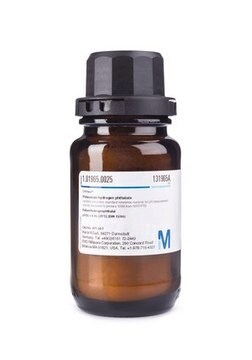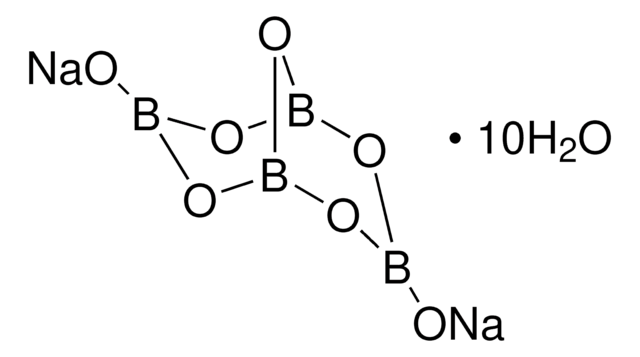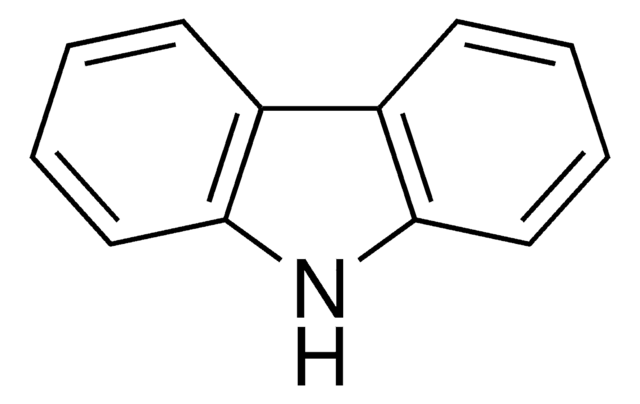1.06310
di-Sodium tetraborate
for analysis (ca. 85% Na₂B₄O₇)
Synonym(s):
di-Sodium tetraborate, Borax
About This Item
Recommended Products
vapor pressure
20-°C ( 68 °F)
Quality Level
Assay
≥85.0% (acidimetric)
form
solid
pH
9-10 (20 °C, 25 g/L in H2O)
bp
1575 °C/1013 hPa (anhydrous)
mp
742 °C (anhydrous)
solubility
water: Ca. 25 g/L at 20 °C (68 °F)
density
2.35 g/cm3 at 26 °C
bulk density
680 kg/m3
anion traces
chloride (Cl-): ≤0.002%
phosphate (PO43-): ≤0.002%
sulfate (SO42-): ≤0.01%
cation traces
Ca: ≤0.01%
Fe: ≤0.001%
heavy metals (as Pb): ≤0.002%
storage temp.
2-30°C
Application
- Micellar electrokinetic chromatography for separation of a mixture of coptis alkaloids, scute flavonoids, and rhubarb anthraquinones and bianthrones.: This study by Chang and Sun investigates the use of micellar electrokinetic chromatography (MEKC) to separate complex mixtures of bioactive compounds. The research highlights the effectiveness of di-Sodium tetraborate in optimizing the separation process, showcasing its utility in analytical chemistry for the precise analysis of natural products (Chang et al., 2006).
Analysis Note
Chloride (Cl): ≤ 0.002 %
Phosphate (PO₄): ≤ 0.002 %
Sulfate (SO₄): ≤ 0.01 %
Heavy metals (as Pb): ≤ 0.002 %
Ca (Calcium): ≤ 0.01 %
Fe (Iron): ≤ 0.001 %
Signal Word
Danger
Hazard Statements
Precautionary Statements
Hazard Classifications
Eye Irrit. 2 - Repr. 1B
Storage Class Code
6.1D - Non-combustible, acute toxic Cat.3 / toxic hazardous materials or hazardous materials causing chronic effects
WGK
WGK 1
Flash Point(F)
Not applicable
Flash Point(C)
Not applicable
Certificates of Analysis (COA)
Search for Certificates of Analysis (COA) by entering the products Lot/Batch Number. Lot and Batch Numbers can be found on a product’s label following the words ‘Lot’ or ‘Batch’.
Already Own This Product?
Find documentation for the products that you have recently purchased in the Document Library.
Customers Also Viewed
Our team of scientists has experience in all areas of research including Life Science, Material Science, Chemical Synthesis, Chromatography, Analytical and many others.
Contact Technical Service








